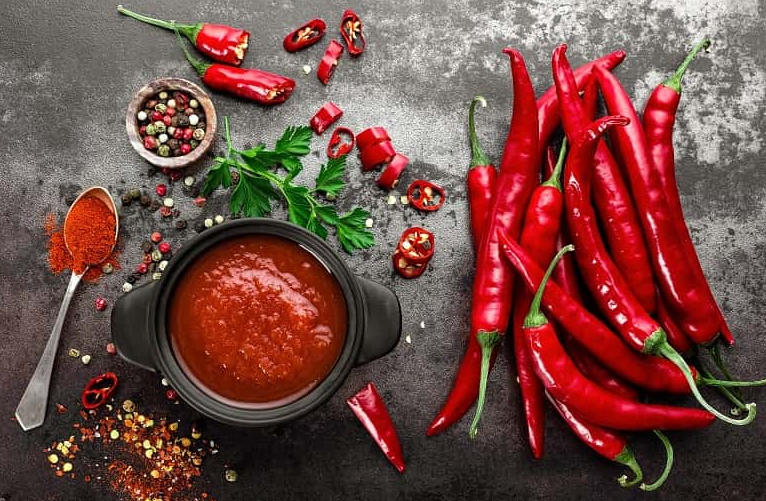The consumption of large quantities of hot pepper may cause severe digestive symptoms in the short term. Capsaicin is present in it. Hot peppers do not harm the intestinal wall when consumed.

Some side effects include:
Stomach ache.
diarrhea;
Vomit;
It is important to note that spicy foods do not cause ulcers in people with digestive problems. However, they can also cause other side effects. People with irritable bowel syndrome, inflammatory bowel disease, or indigestion should reduce their consumption of hot peppers and other spicy foods.
Spicy foods
Various people respond differently to spicy foods, some tolerate the heat, while others have a more sensitive gut and may experience diarrhea after eating them. The reason for this is that capsaicin stimulates receptors in the body that send signals to the brain, so the brain interprets these signals and releases endorphins. As capsaicin stimulates the small intestine, it may spread rapidly to the large intestine, where it activates receptors that prevent the large intestine from absorbing water, resulting in diarrhea.
It is necessary to avoid spicy foods for a few days if you suffer from diarrhea after eating spicy foods.
Caffeinated drinks can aggravate diarrhea, so stay hydrated to soothe the gut.
In a study published in Nutrients in 2019, consuming large amounts of hot peppers was significantly associated with cognitive decline.
Accordingly, hot peppers may be associated with an increased risk of dementia. Dementia causes memory, thinking, and behavior to deteriorate, as well as reducing the ability to carry out daily tasks, and although it often affects older people, it isn’t a normal part of aging.
Here are some frequently asked questions about spicy foods:
Can spicy foods cause stomach ulcers?
In addition to its pain relieving properties, capsaicin has been shown to reduce the risk of ulcers caused by eating foods containing a lot of spices.
According to a 2007 study published in Critical Reviews in Food Science and Nutrition, capsaicin in hot peppers does not stimulate the stomach to secrete acid but rather reduces it and stimulates its release. It is worth mentioning that the role of mucous and alkaline substances, in addition to stimulating the blood flow of the mucosa, that reduces the risk of ulcers and speeds up their healing, is due to the stimulation of stomach nerve cells by capsaicin. Activating factors that reduce wound exposure by sending signals to them.
According to a 2020 study, capsaicin in hot peppers has an analgesic effect that persists even after the pepper has worn off in adults, and that a long-term hot diet may lower the pain threshold.
Hemorrhoids are caused by spicy foods?
There is a common misconception that spicy foods cause hemorrhoids, but this is not true. The Journal of Colon and Rectal Diseases published a study in 2006 that found no scientific evidence that eating meals containing hot chili peppers causes hemorrhoids to worsen.
However, some may feel pain after eating spicy food, which some may think is caused by hemorrhoids, but actually it is caused by anal fissures. The anus has small fissures that are very painful.
In 2008, a study published in Arquivos de Gastroenterologia found that hot pepper consumption may worsen acute anal fissure symptoms.
Can spicy foods cause cancer?
The studies conducted on the relationship between hot pepper and cancer are very different, the results are contradictory, and they have not been conducted on humans. Thus, the results of these studies are unclear. There is a need for more studies to determine its effects.
According to a 2006 animal study published in the Journal of Cancer Research, capsaicin may slow the growth of prostate cancer cells in some laboratory studies.
Spicy foods have the following benefits:
Eating spicy food once a day for a week reduces the death rate by 14%.
As mentioned earlier, it reduces the formation of cancer cells. Cancer cells are inhibited by capsaicin in the body. Prostate cancer can be controlled by capsaicin, according to a 2006 study published in Cancer Research.
In a study published in the Chinese Medical Journal in 2021, it was found that spicy food consumption significantly increased cognitive levels, modified cognitive and brain states associated with Alzheimer’s disease, and reduced Alzheimer’s biomarkers.


